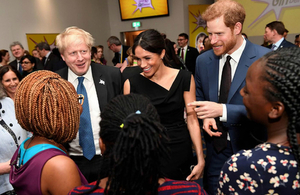Foreign Secretary launches Platform for Girls' Education
Foreign Secretary Boris Johnson calls on world leaders to ensure 12 years of quality education for all.

HRH Prince Harry and Ms Meghan Markle with the Foreign Secretary at the launch event.
At a launch reception attended by Ms Meghan Markle and HRH Prince Harry, the Foreign Secretary Boris Johnson made his case to global leaders to sign up to 12 years of quality education for the world’s most marginalised girls.
Britain will lead by example and will provide £212 million in UK aid money to help one million vulnerable girls across the Commonwealth receive 12 years of quality education by 2030.
Mr Johnson also launched his Platform for Girls’ Education, a group of 12 influential figures from across the Commonwealth to drive forward the political momentum on girls’ education. The group will hold countries to account and champion best practice across the Commonwealth. Amina Mohammed, the Kenyan Cabinet Secretary for Education will co-chair.
Foreign Secretary, Boris Johnson said:
Girls’ education is the Swiss Army knife, the Rosetta Stone, the Black and Decker toolkit that solves a multitude of the world’s problems.
Educating girls is in all our interests. If we fail, we store up huge problems for the future and wilfully miss out on boosting economic growth, managing population pressures and creating stable, prosperous societies.
As a Commonwealth we’ve pulled together to make one of the great problems of our time a global priority. We must keep up the momentum, we must drive forward change and we must do everything to ensure that the world’s poorest girls get 12 years of quality education.
Prince Harry and Ms Markle met and spoke with Commonwealth ministers and individuals who work to promote girls’ education worldwide.
Despite global efforts, poverty, cultural taboos, poor teaching and a lack of resources is shutting the world’s girls out of the classroom. The recently launched Policy Lab will bring the UK’s world-class expertise to help Commonwealth countries deliver for girls – supporting developing countries to ultimately become self-sufficient and provide quality education. This will begin with a pilot of five countries.
All children have the right to learn in safe environments. However, in conflict zones schools are often used as bases for the military and become targets. That’s why the UK has this week endorsed the Safe Schools Declaration and is lobbying Commonwealth countries and the wider international community to do the same. This is a real and urgent problem - globally over 130 million girls are not in school, and in conflict areas girls are over twice as likely to be out of school.
Australia, Ghana, Kenya and Sierra Leone are among other Commonwealth countries that have this week confirmed their own commitments to provide 12 years of quality education for all.
See also Special Envoy for Gender Equality Joanna Roper’s blog on the importance of girls’ education.
Further information
-
Follow the Foreign Secretary on Twitter @BorisJohnson and Facebook
-
Follow the Foreign Office on Twitter @foreignoffice and Facebook
-
Follow the Foreign Office on Instagram, YouTube and LinkedIn